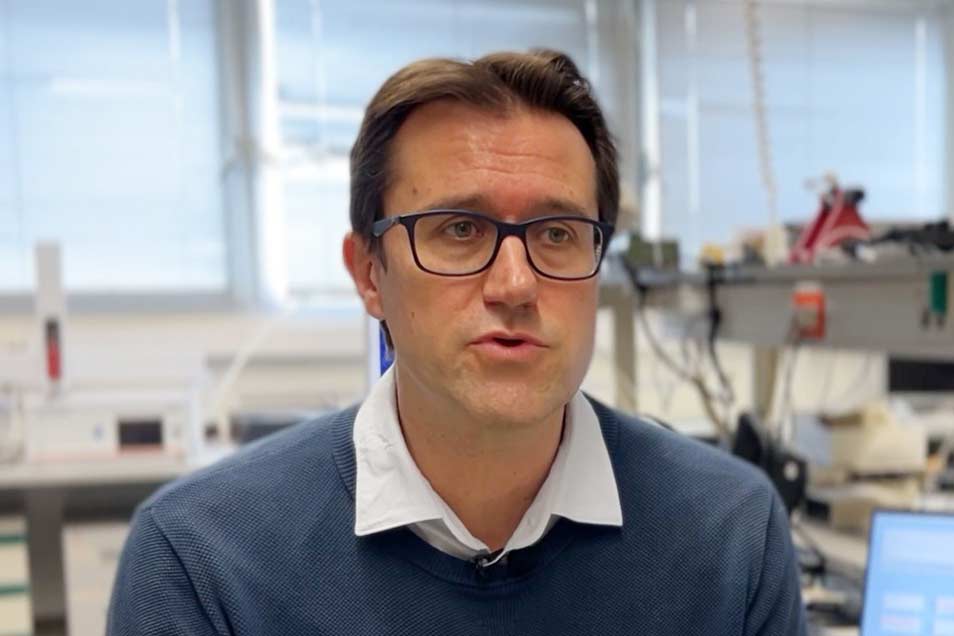
Agustí Gutiérrez: “With the drone we can efficiently measure pollution from volatile chemical products at industrial plants”
(Year 2022)
We spoke with Dr Agustí Gutiérrez Gálvez, associate professor in the Department of Electronics and Biomedical Engineering of the University of Barcelona Faculty of Physics, about the drone project he is working on to monitor pollution from industrial plants and find the source of odours at water-treatment plants.
It is a European project led by the UB with collaboration from the University of Lancaster, Institute for Bioengineering of Catalonia (IBEC), Depuración de Aguas del Mediterráneo (DAM), Foundation for Scientific and Industrial Research (SINTEF) and Gas Sensing Solutions (GSS).
Can you tell us about the project you are working on?
This project aims to monitor pollution from volatile chemical products generated by industrial plants, which can be harmful to their workers and the general population.
And how are you doing that?
We’re using a drone equipped with a gas sensor that flies over the plant. The drone measures the whole plant quickly and allows us to locate any volatile chemical products and sources of odours there may be.
What sets your project apart?
One of the things that sets our project apart is that we don’t just measure volatile chemicals. We’ve established a system with artificial intelligence that can predict the smell a person will perceive. Using data from the sensors on the drone, we correlate chemical substances and people’s perception of the smell. So, we can build a model that correlates the sensors’ response with people’s perception.
Where could this technology be applied?
It is designed mainly to monitor industrial plants, such as water-treatment plants, composting plants and other types of plants. It could also be applied to measure pollution in ports, where there is a lot of pollution from the ships.
Why is it important to monitor pollution from water-treatment plants?
Because this pollution is a problem, first of all in terms of the safety of the workers at the plant. They aren’t exposed to high enough concentrations to have immediate health issues but in the long term, they could develop health problems due to an accumulation of these volatile substances.
Another problem must be the smell of the treatment plants.
Exactly. People living nearby complain a lot about the bad smell. That depends on the weather conditions (how warm it is, the wind, etc.). To deal with this, they currently have a network of static sensors. But the big problem is that volatile chemical substances are very hard to monitor because they spread unevenly around the area and change over time. So, with a static sensor it’s very hard to get a full overview of the issue, to see what is really happening and where the gas is coming from. With a mobile system like ours, you can get into any part of the industrial plant and map the pollution in that area.
Where is the project at now?
We have a prototype that has been tested but we need to keep improving it to get a prototype that is more technologically mature and robust, that we can take to market.
To finish off, you were one of the researchers from the University of Barcelona who took part in the Science + Partners event organised by Bosch i Gimpera Foundation. How did it go?
It was a very helpful event. We got opinions from people who were looking at our product from a commercial standpoint. You don’t normally see that, and I think it’s really good to get a vision of the aspects needed to develop a product that can reach the market.
More about Agustí Gutiérrez Gálvez
The best invention ever?
The computer.
What would you like to see in the future?
Robotics being used not only by a small fraction of society, but for all citizens to benefit from the advances in technology.
A future breakthrough that scares you?
All the military technology being developed.
Someone you admire?
Isaac Newton.
Transfer is important for…
A quick, direct return on society’s investment in the university.

